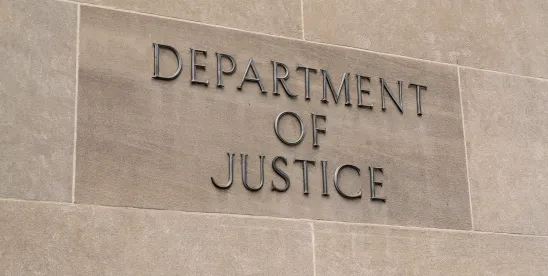From time to time, the Department of Justice (“DOJ”) has established initiatives, task forces, or strike teams to advance its enforcement priorities. In recent years, DOJ has announced a Procurement Collusion Strike Force, a COVID-19 Fraud Enforcement Task Force, and a Civil Cyber-Fraud Initiative, in each instance explicitly invoking a plan to use the False Claims Act (“FCA”) for civil enforcement.
DOJ announced the latest version of this enforcement approach on May 19, 2025, when Deputy Attorney General (“DAG”) Todd Blanche issued a memorandum announcing a new Civil Rights Fraud Initiative (“the Initiative”), described as a coordinated and “vigorous” effort to leverage the specter of FCA liability against recipients of federal funding alleged to be violating civil rights laws. The types of alleged civil rights violations targeted by this Initiative relate to diversity, equity, and inclusion (“DEI”) programs, antisemitism, and transgender policy, all of which dovetail with a number of Executive Orders (“EOs”) expressing President Trump’s approach to these issues.
Relevant Executive Orders
Some of the EOs relevant to the Civil Rights Fraud Initiative include:
EO No. 14151: Ending Radical and Wasteful Government DEI Programs and Preferencing (January 20, 2025). This EO directs federal government agencies to end DEI and diversity, equity, inclusion, and accessibility (“DEIA”) programs, to eliminate positions such as “Chief Diversity Officer,” and to terminate grants and contracts related to DEI and DEIA. It also orders a review of federal employment practices to ensure they focus on individual merit rather than DEI factors.
EO No. 14168: Defending Women From Gender Ideology Extremism and Restoring Biological Truth to the Federal Government (January 20, 2025). This EO declares, as United States’ policy, that there are two immutable sexes (male and female), based on biological reality. It requires changes to government-issued identification documents and prohibits federal funding for so-called “gender ideology.”
EO No. 14173: Ending Illegal Discrimination and Restoring Merit-Based Opportunity (January 21, 2025). This EO requires that all federal contracts and grants include a certification that recipients do not operate any DEI programs that violate applicable antidiscrimination laws and affirms that compliance with federal anti-discrimination laws is material to government payment decisions. Additionally, the EO directs DOJ to identify key sectors and entities for DEI-related enforcement, and to recommend strategies to end “illegal DEI discrimination” in the private sector.
EO No. 14188: Additional Measures To Combat Anti-Semitism (January 29, 2025). This EO reaffirms EO 13899 from December 11, 2019, which aimed to combat antisemitism, particularly in educational institutions. It directs various federal agencies to identify actions to curb antisemitism and recommends monitoring foreign students and staff for antisemitic actions.
EO No. 14201: Keeping Men Out of Women's Sports (February 5, 2025). This EO aims to exclude transgender individuals from competing in women’s sports. It directs the Secretary of Education to rescind funding from educational institutions that do not comply.
Structure of the Civil Rights Fraud Initiative
Against the backdrop of these EO policy statements, DOJ’s Civil Rights Fraud Initiative presents a concrete risk of investigation—and potentially FCA liability—for companies, organizations, and institutions that receive federal funding.
The Initiative will be led by the Civil Division’s Fraud Section and the Civil Rights Division, who are directed to coordinate and share information about potential violations.[1] Those units are instructed to work with the Criminal Division of DOJ and other agencies that “enforce civil rights requirements for federal funding recipients,” including the Departments of Education, Health and Human Services (“HHS”), Housing and Urban Development (“HUD”), and Labor. Additionally, each of the United States Attorney’s Offices must designate an Assistant United States Attorney to support the Initiative’s efforts, and DOJ also anticipates involving state Attorneys General.
Scope of Intended FCA Enforcement
The Blanche memorandum casts a broad net describing the scope of the Initiative’s work. It invokes civil rights laws, “including but not limited to Title IV, Title VI, and Title IX, of the Civil Rights Act of 1964.” These statutory provisions generally prohibit discrimination on the basis of race or sex in educational settings and other programs that are supported by federal funding. DOJ’s Civil Rights Division is responsible for investigating and enforcing violations of these provisions, and the Division traditionally seeks relief in the form of litigation, consent decrees with mandatory reporting, and required remediation measures designed to cure the unlawful practices, as well as coordinated audit efforts with the Equal Employment Opportunity Commission.
The Blanche memorandum identifies other areas of focus for the Initiative without reference to particular statutes, regulations, or standard contract provisions, including:
- Antisemitism: “… a university that accepts federal funds could violate the False Claims Act when it encourages antisemitism, [or] refuses to protect Jewish students.”
- Transgender participation: a university that “allows men to intrude into women’s bathrooms or requires women to compete against men in athletic competitions.”[2]
- DEI programs: The memorandum states that the Initiative will use the FCA to stop the “fraud, waste, and abuse” that allegedly occurs when recipients of federal funding “certify compliance with civil rights laws while knowingly engaging in racist preferences, mandates, policies, programs, and activities.” The memorandum further states that “many corporations and schools continue to adhere to racist policies and preferences—albeit camouflaged with cosmetic changes that disguise their discriminatory nature.”
A Clarion Call to Whistleblowers
The Blanche memorandum states that DOJ “alone cannot identify every instance of civil rights fraud,” and the DOJ therefore “strongly encourages” potential whistleblowers to participate in the Initiative by filing lawsuits under the FCA’s qui tam provisions. These provisions allow a private party to file (under seal) a lawsuit on behalf of the United States alleging the FCA violations, and to continue pursuing that lawsuit even if DOJ declines, usually after lengthy investigation, to intervene in the case. The FCA rewards these “qui tam relators” with a share—up to 30 percent—of any amounts recovered in the case. Successful qui tam relators are also entitled to recover their reasonable attorney’s fees and costs from the defendant.[3]
Given these considerable financial incentives, the Initiative likely will result in qui tam lawsuits related to DEI, antisemitism, or transgender policies in women’s sports or in women’s bathrooms.[4] Aside from the option to file suit, the Blanche memorandum asks “anyone with knowledge of discrimination by federal-funding recipients to report that information” so that DOJ can take action.
Applying the FCA to Civil Rights
Courts historically have interpreted the FCA’s basic elements of “knowingly” submitting (or causing the submission of) “false claims” to the government broadly, to reach all manner of alleged schemes—from billing for healthcare services that were not provided to impliedly certifying compliance with complex cybersecurity standards; from alleged misuse of federal grant funds to avoiding customs duties.
In these more conventional applications, DOJ (or a qui tam relator) alleges noncompliance with an underlying contract term, statute, or regulatory requirement under an express or implied “false certification” theory of FCA liability. In those cases, the FCA’s materiality element serves as an important check. Only if the underlying violation or compliance issue is “material” to the government’s decision to pay does FCA liability attach.[5]
Because DOJ has other mechanisms at its disposal to investigate and correct non-compliance with civil rights laws, using the FCA to address discrimination has been relatively uncommon. Application of the FCA to civil rights matters is not entirely without precedent, however. For example, in 1995, the government pursued FCA claims against a locality for ignoring conditional spending requirements attached to housing grants.[6] A decade later, DOJ announced a significant settlement against Westchester County, New York, to resolve a qui tam lawsuit alleging that the county falsely certified its compliance with fair housing obligations in order to receive federal funds through a block grant.[7] In 2024, DOJ resolved qui tam allegations that the City of Los Angeles knowingly failed to meet accessibility requirements for the disabled in seeking federal grant funds to build affordable housing.[8] Each of these cases was premised on a “false certification” theory, meaning the government relied upon the defendants’ allegedly false certifications that they would comply with federal fair housing or accessibility laws when funding the grants or contracts at issue. DOJ claimed that those recipients of federal funds violated clearly stated contractual, statutory, or regulatory requirements.
Challenges to Proving FCA Liability
The civil rights violations that the Blanche memorandum discusses most extensively relate to DEI programs. But, as we discussed in an earlier client alert, the government will face a number of challenges to establishing FCA liability based on an entity’s DEI program, even when a DEI certification requirement (such as those mandated by EO 14173) is at issue. The DEI certifications that have been promulgated to date do not use standardized language across the government, incorporate undefined terms, and are not part of any overarching statutory or regulatory framework with which federal funding recipients (or even judges) are familiar. In these circumstances, the government (or a qui tam relator) will have difficulty establishing the FCA elements of falsity and scienter (“knowledge”).
The FCA’s materiality element will also be challenging for the government to prove, since the broad DEI certifications currently being imposed on contractors from EO 14173 rarely bear any connection to the purpose of the government contract or grant agreement. In the cases mentioned above, the alleged false certification tied directly to the reason for funding, e.g., an agreement to abide by fair housing requirements to receive federal funds to build housing. By contrast, it seems unlikely that even a known DEI compliance issue would cause the government to withhold payment of invoices for work or goods that fulfilled the contract.
Nonetheless, DOJ’s announcement of the Initiative presents a number of unanswered questions as to when an entity might face investigation, whether or not liability can be proven. For instance, it is not clear whether a company that is found liable for—or even settles—an employment discrimination claim could be subject to inquiry on the basis that the company “knows” it has violated Title VII.
Similarly, the Blanche memorandum’s suggestion that an FCA investigation could be triggered for universities (and perhaps companies) that allow transgender access to women’s bathrooms raises further questions. There is no express certification in government contracts or grants on this issue; nor is there a federal law specifically governing access to women’s bathrooms, making it difficult to imagine how the falsity, scienter, or materiality elements of the FCA could be proven. In the aggressive enforcement environment that the Blanche memorandum heralds, however, this may be precisely the kind of test case that a qui tam relator may decide to pursue.
Somewhat ironically, the Blanche memorandum’s threat of FCA liability based on EO policy statements (in contrast to the specific statutory regimes it mentions), contradicts the first Trump administration’s declaration that enforcement should not be based on “sub-regulatory guidance.” The January 25, 2018 memorandum by then-Associate Attorney General Rachel Brand sought to curtail prosecutions of alleged violations of policy. Even though the Brand memo was rescinded during the Biden administration, its approach aligned with the FCA principle that, for a claim to the government to be actionable, there must be some demonstrable noncompliance with a material contract-term, statute, or regulatory provision. The Blanche memorandum deviates from this approach by suggesting that DOJ will investigate and pursue as FCA matters conduct that the administration deems objectionable.
Conclusion
With the new Initiative, DOJ is signaling its intent to aggressively pursue civil FCA enforcement actions for conduct that violates existing civil rights laws as well as the administration’s policy views. Time will tell whether this Initiative broadens the scope of FCA liability, but it certainly increases the risk that companies and organizations will need to deal with whistleblowers, lengthy investigations and potentially costly litigation, and the attendant reputational harm that can arise from being the target of allegations of fraud against the government.
[1] According to recent reports, DOJ’s Civil Rights Division will lose more than half of its attorney staff by the end of May 2025. See 70% of the DOJ's Civil Rights Division lawyers are leaving because of Trump's reshaping : NPR (“Some 250 attorneys — or around 70% of the division's lawyers — have left or will have left the department in the time between President Trump's inauguration and the end of May, according to current and former officials.”),
[2] The reference to “men” appears to refer to transgender women, in keeping with EO 14168 establishing as the “policy” of the United States “to recognize two sexes, male and female.”
[3] See 31 U.S.C. § 3730(b)-(d) (actions by private persons; rights of the parties to qui tam actions; award to qui tam plaintiff).
[4] Over the past forty years, qui tam relators have brought cases yielding recoveries to the United States of more than $55 billion. Relators collectively have received about $9.5 billion in recoveries, exclusive of claims for attorney’s fees and costs. See Civil Division, Department of Justice, “Fraud Statistics Overview: October 1, 1986-September 30, 2024.” (Jan. 15, 2025), available at https://www.justice.gov/archives/opa/media/1384546/dl.
[5] The Supreme Court has described FCA materiality as a rigorous—and often fact-intensive—gatekeeper. To demonstrate that an underlying violation was not material to the government’s payment decision, however, defendants may need to collect extensive evidence during litigation and discovery.
[6] United States v. Incorporated Village of Island Park, 888 F. Supp. 419 (E.D.N.Y. 1995).
[7] United States ex rel. Anti-Discrimination Center of Metro New York, Inc. v. Westchester County, New York, 668 F. Supp. 2d 548 (S.D.N.Y. 2009).
[8] United States ex rel. Ling, et al. v. City of Los Angeles, et al., CV11-974-PG (C.D. Cal.); See United States Department of Justice Press Release





 />i
/>i

